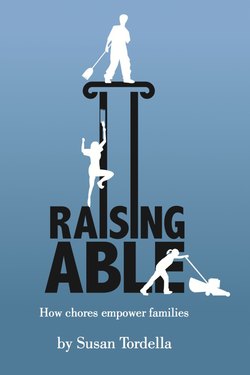Читать книгу Raising Able - Susan Tordella - Страница 30
На сайте Литреса книга снята с продажи.
The lost tradition of childhood chores
ОглавлениеAs recently as a century ago, children were essential to the dominant family business of the era: farming. Most school calendars still reflect the obsolete need to free the youngsters to assist with food production in summer.
The exodus from the farm lifestyle has dramatically changed what we expect from them.
In only a century, children shifted from being an economic asset to an economic liability. They are no longer active contributors to the family well-being. They have morphed into being mini-consumers and performers. Parents and paid caregivers wait on them. Divorced parents vie for their attention and time.
People have fewer children in the new millennium, and ask less from them. Out of necessity, larger families and single parent families are more likely to have chore systems, according to my survey.
Families orchestrate weekends so children can perform in adult-controlled competitions of youth sports, dance, beauty contests, creativity competitions, scouting, 4-H, pets, music and more. Instead of a childhood full of play and exploration, with some chores, children are routed towards being mini-adults with the goal to make their parents proud.
Children have also gained rights, freedom, and an unprecedented voice within the family, with correspondingly few responsibilities. They consume more and produce less.
In the competition to have winning performers, “helicopter parents” hover over their children’s every homework assignment, soccer practice, and music lesson. Helicopter parents advocate for their children with teachers and coaches to insure the child is insulated from failure, which theoretically damages self-esteem.
Ironically, trial and error is often the best teacher. We often learn more from hard-earned failure than from easy success. Many children and teens live up to their entitlement with little awareness or apology in today’s world where everyone gets a trophy.
A system for chores benefits everyone
Children with attention deficit disorder can benefit from chores and responsibility because it prepares them to develop coping skills. For example, Jamal has ADHD so his mother never expects him to remember to feed his bird or clean the cage, chores she has taken on. “I always have to remember his diagnosis,” mom said, quoting Jamal’s pediatrician. Remembering the diagnosis is different than setting low expectations. Jamal’s mother is doing him no favors by being his servant. Jamal has no problem managing his time to play endless hours of video games and ignore his bird. Jamal and his mom need to figure out a system to remind him to care for his pet, or give the bird away.
Children with chores feel they belong to a group and that the group depends on them. This connection to family is the fundamental belief of Adlerian psychology. Show me a child with a job around the house and I’ll show you someone with greater odds to become a responsible teenager, and an independent adult able manage his or her life.
They have been raised with the mistaken beliefs they can do no wrong, that everything they do is wonderful, and their demands often run the family. Without the opportunity to learn from mistakes, children never develop resilience and the courage to try again, try harder, or try a different approach. They want everything with a click of a mouse or faster than sending a text message.
Instead of developing character through chores, children ask for – and get – another handout from mom and dad, and spend their days suspended in sugared-screen time, consuming sugar and high-fructose corn syrup in front of a variety of screens: TV, computer, video games, iPods, Blackberries, cell phones and more.
Both parents often scramble in an outside career to support their children’s ceaseless want list. They feel guilty over the litany of what their children don’t have, and compensate by giving into their children’s demands.
Parents have only one brief shot at raising children before their childhood is sealed in the hard drive of memory. By age 11, their belief system is entrenched and they become more difficult to influence. The less time parents spend with their children, the more difficult it is to influence them. When we give more things and money and ask less from children, it adds up to entitlement. We’ve become their servants. They’ve become performers and consumers.
